As requested by anon a few days ago, I have sat down and done this. I totally started on it while I was supposed to be doing other things, but I can proudly confirm said other things got finished in the meantime, too. So here goes…
Mikami in Manga vs Anime - A Comparison
This is an interesting topic in the sense that a lot of Mikami has been adapted very faithfully except for a few portions where he’s been completely altered, like the finale. The anime strikes a weird balance between making Mikami more stock villain demonic and more sympathetic somehow.
At Mikami’s introduction the anime puts a lot of emphasis on dramatic imagery, gladly at the cost of logic. Mikami is introduced in medias res while the manga gives us a chronological approach in which we first see him on TV when Light considers choosing him. This is a flashback in the anime.
Anime!Mikami gets first shown without any prior build-up as he kills Demegawa while dramatic music chants in the background. The scene is set up visually to make Mikami look intimidating - shots of Demegawa stumbling backwards and Mikami stepping forward are mixed to create the illusion of them interacting in a fashion. The first impression the anime thus creates of Mikami is that he is someone to be feared, his cruelty and capacity for murder are his introduction.
Further, he is placed against a rather impressive backdrop. Compared to the manga, his room loses any last shred of realism, turning it into some sort of dark hallway hellscape dungeon.
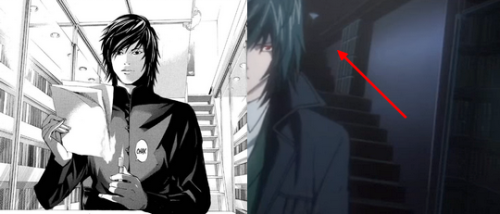
Where manga!Mikami lives in a rather confined and overseeable space, anime!Mikami has his desk at the end of a seemingly endless stairway leading up into nightmare infinity or something. The whole room appears a little wider, next to his desk more hallways go to the side in a T form, their ends as undisclosed as the end of the stairway. The whole room is giant, dark and only illuminated by artificial light.
Now, impressions are subjective, but to me the manga room gives off an image of someone wealthy and overtly orderly who likes to read. The anime room doesn’t give off the atmosphere of a living space to begin with. It’s dark and intimidating and physically impossible to be an apartment located in a large apartment complex (which it is canonically supposed to be.)
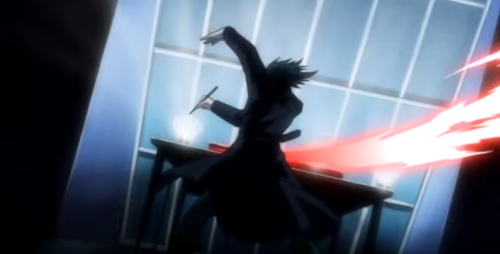
Furthering an intimidating, impressive but ultimately unrealistic image of Mikami, we get his dramatic writing sequence. He’s writing in standing, still wearing his outdoors coat despite the fact that he is in his own home. His desk chair is nowhere to be seen despite him sitting down on it only a minute later within the same episode.
Death Note is a series that largely prides itself on realistic character situations, aside from the supernatural killing notebook, and while the anime already breaks with it occasionally (Light writing on the roof, anyone?) Mikami is the only character who is introduced in a completely illogical situation.
I was honestly tempted to write “Mikami is introduced as the abstract aesthetic of ‘tall, dark and dangerous’ rather than as a character” and I don’t think it’s too off. Mikami’s introduction largely focuses on impressiveness, not on giving a glimpse at Mikami as a defined character. This is then rectified in the next episode.
Another interesting thing about Mikami’s introduction at the end of episode 31 is that the focus is shifted away from Mikami’s own initiative and instead given to Light’s scheming. This will turn out to be a bit of a pervasive pattern.
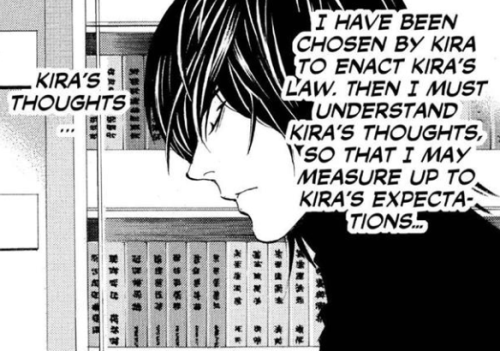
The manga gives us Mikami’s independent thought that leads up to Demegawa’s murder. There is a sequence longer than a page that focuses on Mikami’s internal monologue that ends in him seeing it as his task to act independently. The focus is on Mikami’s own agency as a character.
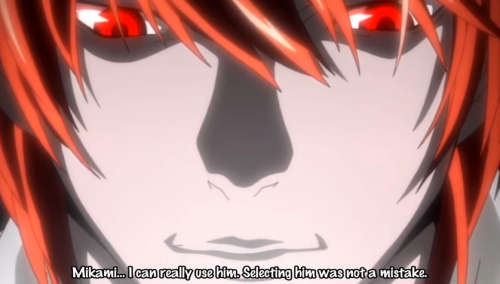
The anime gives us a sequence full of Light being self-congratulatory .
He, too, commends Mikami for thinking about Kira’s ideals independently and acting on it, but it is entirely framed by his self-satisfaction.
This scene is primarily about Light and him being a good puppet-master.
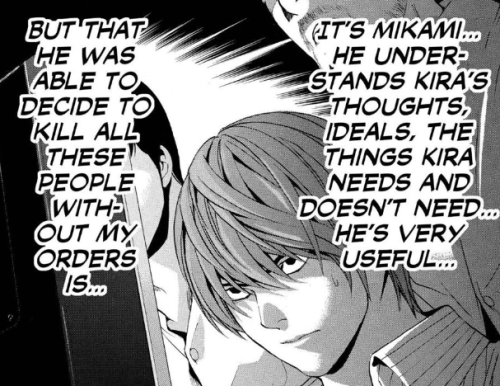
The manga doesn’t offer this smug smirking. Light is genuinely surprised by Mikami’s independent actions - the credit here goes to Mikami primarily and only secondarily to Light.
The anime is big on this - agency being taken away from characters and instead being given to Light definitely happens with Misa and Takada as well and will continue to happen with Mikami at least a bit. Instead of being shown as their own people, characters are often utilized to emphasize Light’s bad traits instead.
But of course, there’s not only that. Which is why Mikami gets half of the next episode dedicated to his backstory, expanding it further than even his manga chapter goes. Further than that, we also get glimpses into Mikami’s daily life.
For example this:
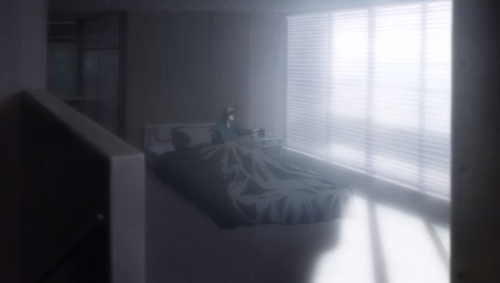
His bedroom is never shown in the manga so there is no possibility to compare, but it’s an interesting visual again. Like his study, the room is huge but also virtually empty, devoid of all personal belongings.
A very Mikami aesthetic. All further instances of showing Mikami’s life fit this aesthetic and depict him as an isolated and punctual person.
They do not add anything new to his character and just bring out aspects also present in the manga, so I won’t go through them with individual caps. One nice touch here is that Mikami going through his day is shown as clocks are deliberately displayed to change minutes. The clockwork punctuality is emphasized subtly, I really like that.
The only part I’d like to discuss is when he witnesses a child getting bullied on the train. Teru walks over and stops the bullies by placing a hand on one’s shoulder and giving this sad puppy look:
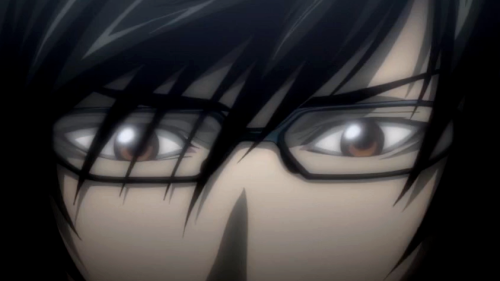
I think this scene is the strongest example for moments in which the anime tried to paint Mikami a lot more sympathetically than the manga. It’s a very gentle-looking moment of interaction and instead of anger, the emotion we can interpret into Mikami here is more likely to be disappointment and sadness at the fact that the children are doing this. It’s a comparatively soft scene.
At this point I’d like to go off on a tangent and talk about the role of eyes in character perception and how the atmosphere around Mikami changes solely due to the style adaption from manga to anime.
It’s not an issue that is specific to Mikami, but Obata’s art style often leaves the eyes as lightless black:
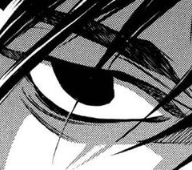
This is very persistent with Mikami and only changes in scenes of Kira-related joy. Otherwise his eyes are always very dark and stern.
The anime utilizes eyes differently than the manga and often uses them to show emotion (while in the manga this is often done by hiding the yes), so shots like the above occur with Mikami. He gets sad eyes that he never had in the manga.
I think the difference in degree of emotion between the eye depictions already serves to bring about a different atmosphere surrounding the character. Since you can read more feelings into anime!Mikami’s eyes, he comes across as more human and sympathetic purely based on the visuals.
Again, this is not a Mikami-specific issue. It’s just something that stuck out to me about how the art style influences perception, at least mine.
So then, the prominent part of this episode is of course Mikami’s backstory.
A major alteration occurs here: the manga gives us an omniscient third person narrator to tell Mikami’s story, in the anime it is his own internal monologue.
As such we lose a considerable degree of objectivity in regards to his background - it’s perception is saturated by Mikami’s perspective now, although the text itself is only altered a little. Some objective comments offering background information are omitted, some phrasings are changed to more personal ones. What sticks out most is this change:
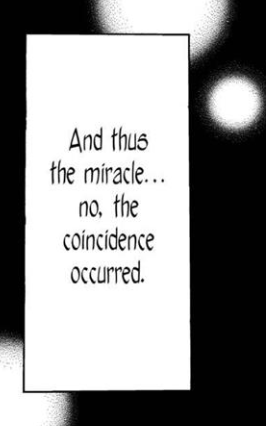
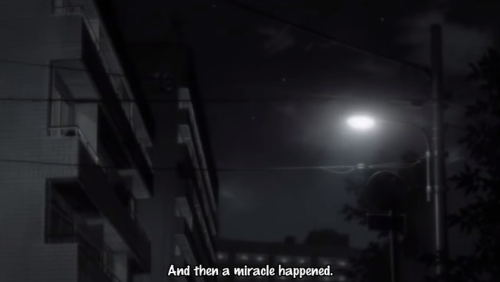
Since it is Teru who is narrating in the anime, he does not possess the objectivity necessary to acknowledge events in his life as coincidence.
The manga labels the whole chapter ‘coincidence’ and very explicitly goes on to say that Teru misunderstands, that he assigns meaning to events that are fundamentally meaningless accidents.
In the anime, this is still the case but it’s a conclusion the viewer is left to draw on their own.
Another small thing about Mikami’s backstory is that we get a few more images of his abuse shown, while in the manga there is only a textual summary (which is not present in the anime, making the visual cues necessary in exchange).
Going further in the story, we encounter the first major change in Mikami’s role in the plot.
Kira needs a spokesperson. Between anime and manga, Mikami deals quite differently with the situation.
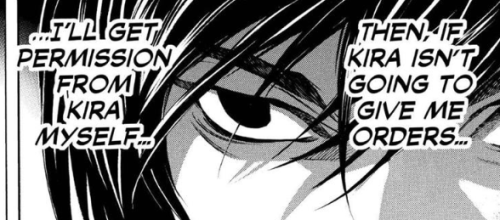
Manga!Mikami goes on TV to get Kira’s permission to chose a spokesperson independently. It’s a risky and bold move, but it also goes to show how much he cares to not act in ways that would be against Kira’s interests.
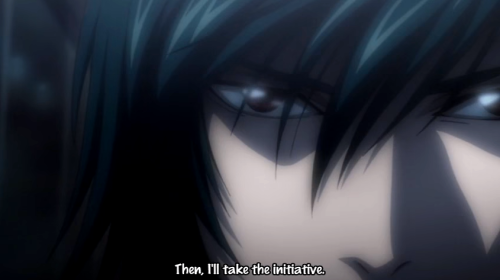
Anime!Mikami skips this step and immediately chooses Takada as spokeswoman without consulting with Kira beforehand.
It’s interesting because technically, anime!Mikami is the more entitled and more independent one here, but it is glossed over very fast and not treated as extraordinary. Meanwhile the manga makes another point to explicitly underline Mikami’s willingness to take risks and act independently.
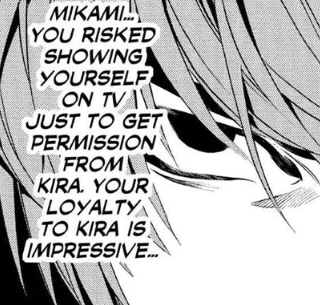
So even though the anime shows a more self-driven Mikami, the emphasis on this is more pronounced in the manga.
Further, the anime merges the two dates Light and Takada have before Mikami calls into one. The side effect here is that Mikami only gets to send out one message to the world, instead of two like in the manga.
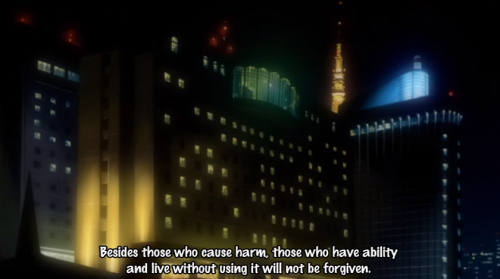
This is the one that Light says is ‘too early’ but does not fundamentally disagree with.
In the manga, Mikami also gives out a second message saying that even people who sat through their sentence are still eligible for being killed for their crimes. This statement is one manga!Light does disagree with:
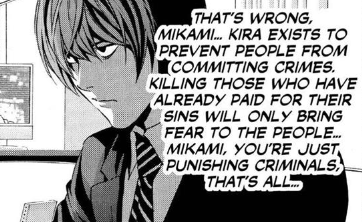
The anime just omitted this to speed up the plot and not to make a character statement, but functionally this amounts to yet another decrease in character autonomy. After all the manga makes a point here to show Mikami and Light do not represent the same ideals and that Mikami strays from the Light!Kira path. The anime doesn’t make this as clear.
The anime further cuts the whole ploy Light uses to make Mikami contact him.
Manga!Teru gets to figure the fact that the real Kira is in contact with Takada out based on Takada suddenly stating her opinion on TV, anime!Teru’s conclusion is a bit different and simpler:
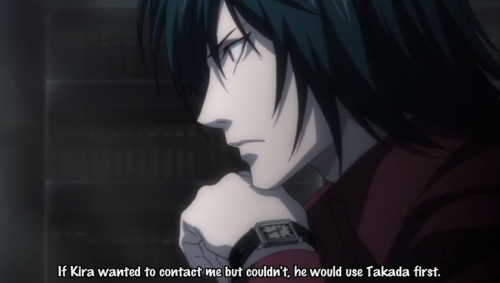
Both reasonings give him a reason to contact Takada and figure out if she’s being talked to by Kira - it’s just that in the manga he has more direct reasons for assuming so, since he’s guided into it by Light’s actions. In the anime, his suspicioun is less founded and he’s more just getting lucky.
So he calls Takada with perfect timing and gets told she’s alone with a friend.
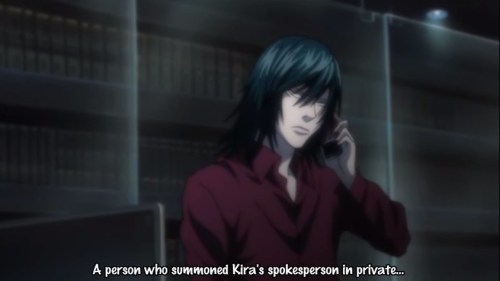
Anime!Mikami has no explicit reasons put general suspicion onto any person who would meet Takada, so this makes him appear a little bit too oblivious of the fact that Takada has a private life. But in his defense, he does have a point to think that the people most influential to Takada would be the ones able to meet her without bodyguards and if Kira contacted her he’d likely orchestrate to be among them. This thought is enough to make him wonder about it and get Light on the phone.
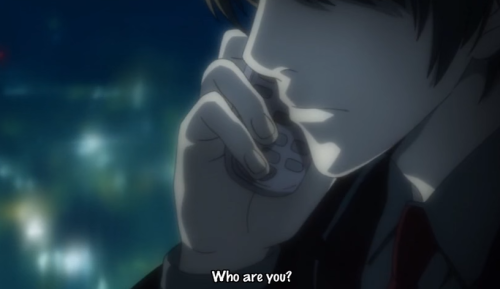
Mikami then asks Light who he is and Light gets to answer with his proof of being Kira. Pretty simple, thanks to convenient timing. Due to the plot-change circumstances, Mikami gets to be a little less forward here than in the manga.
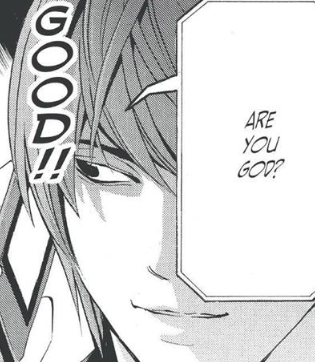
In the manga, he is able to ask Light this flat-out - which makes sense because in the manga he has specific reasons to be suspicious of the person influencing Takada. The anime removed this build-up so it had to remove the directness of the question in order to keep with the flow.
The anime also makes a further change to give control of the situation to Light though. Where in the manga, Mikami kills a Sakura TV person unpromptedly in order to prove his identity, in the anime he only does so on Light’s orders.
We then progress as normal until it gets to the point where Near figures out Mikami is Kira - here Mikami’s speech that, in the manga, is used to get permission from Light is reused and split into two speeches.
The first one of which is a little strange:
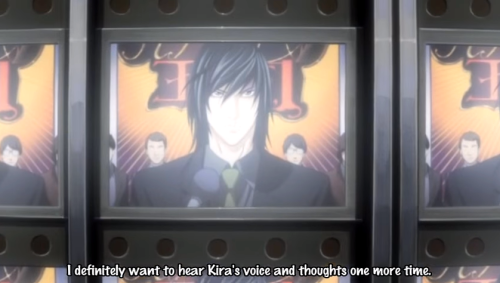
Anime!Mikami hasn’t been on TV since he received the notebook - so he has to have made this specific speech before that.
Now, he’s saying he wants to hear Kira’s thoughts ‘again’ just like he does in the manga - which made sense in the manga because this was after Demegawa’s death, when Kira did not have an acting spokesperson.
In the anime, he says this on Kira’s Kingdom while Demegawa is alive and well, and acting as Kira’s spokesperson (keep in mind, Kira’s Kingdom was only established after Demegawa’s election, so he is definitely acting as Kira’s messager right then).
So essentially, anime!Mikami is asking Kira to give Demegawa more specific orders. I know this is just a continuity mistake on the anime producer’s end, but it just comes across like Mikami saying ‘Demegawa sucks, Kira please come keep him in check’ - or at least reading it as such is amusing me.
On the other hand, this is also in the era in which Mikami is still seeking to get Kira’s attention, so he’s also just advertising himself as someone Kira should share their thoughts with - in that sense, he’s heard when he’s chosen.
The rest of this speech from the manga has been given to his other TV appearance in the anime (the one on the show Takada hosts):
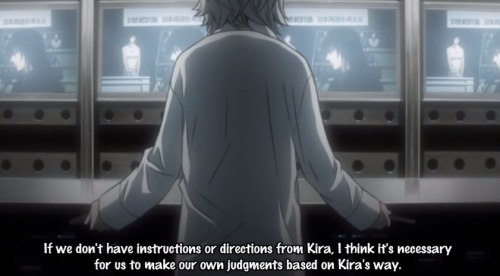
This isn’t a big change for Mikami’s personality, because even though he says it with ulterior motives in the manga, this is still in accordance with his overall ideals when said like it is in the anime.
(As a side-note, this is a scene where butchering Mikami’s permission speech gets in the way for another character - Near. It’s already an ass-pull that he finds Mikami in the manga, but at least he had this scene for a clue. In the anime he’s just downright guessing / using clairvoyance / ascending to godhood and becoming omniscient / whatever. There is literally no basis at all for him figuring out Mikami as an X-Kira suspect.)
Up until the finale, the anime now goes the same way as the manga. So far, this doesn’t seem like a lot of change. It’s largely minor dialogue editing or some tonal shifts. A bit of material has been added and a bit has been removed. It’s overall not a big deal in terms of character perception.
The finale though… There’s a lot more to be said here.
The first thing is that there is no ambiguity about Mikami’s behavior in the anime. The manga presents us with Matsuda’s theory that Near manipulated Mikami in order to secure the warehouse goes over smoothly. This gives us as readers the choice to decide for ourselves whether or not we believe Mikami’s actions to be genuine and natural.
Now, I personally believe that the vastly more logical option for the manga is that Near did indeed manipulate Mikami thoroughly. You can read about this theory here and here, if you’re not up to date on it.
In the anime, this is not possible. For one, we are not presented with the option in the narrative. The epilogue is removed and with it, Matsuda’s speculations are gone from the anime too. The anime does not prompt us to consider this, it does not really legitimize this line of thinking.
The other thing is that Mikami’s death in the anime is not at all timed conveniently for Near. Near would have no advantage from Mikami killing himself in the middle of the final showdown.
Hence, we can be quite sure that everything anime!Mikami does during his breakdown is his true thoughts and feelings.
And boy, is his breakdown a breakdown.
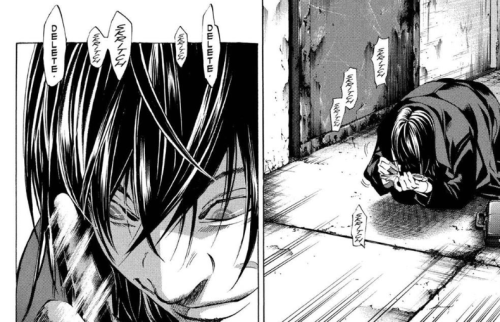
In the manga Mikami is kneeling and writing intently with a manic grin and yeah, that’s creepy. That’s kinda unhinged alright, but it’s… well, human.
But then there’s the anime.
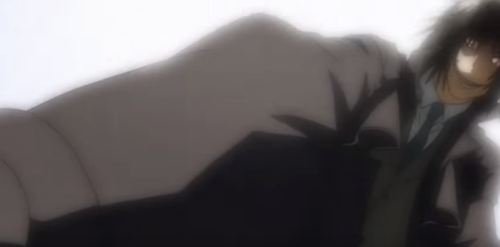
I guess we know now why he lives in a hell dungeon. He’s a demon as well.
This is just one of many demonic faces he pulls in his long sequence.
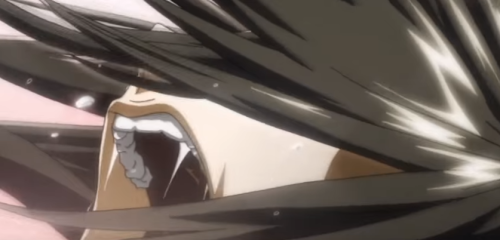
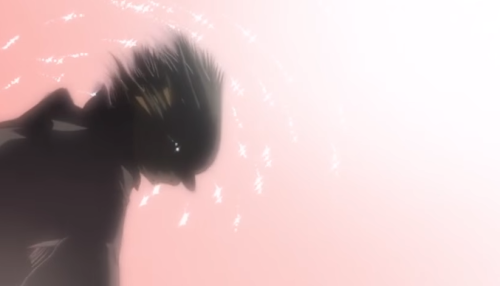
He is legitimately screaming out loud as he somehow lets himself fall backwards.

All fluid here is his own saliva by the way.
So. That happened.
I need to emphasize again.
The anime removed the option of Mikami being manipulated, making his whole behavior genuine without a doubt.
The anime also decided to go fuck-it-all and make him a complete caricature of insanity, again abandoning all reason in favor of visual impressions.
I’m admittedly kind of squicked by how much the anime decided to play up the ‘crazy’ factor here while giving us no other alternative than that we are supposed to marvel at how insane Mikami is. It’s… kinda icky.
This scene is also the one Mikami is remembered for most. In the mind of the casual viewer, this moment seems to overwrite all complexity that is ever hinted at in Mikami’s character. Since this moment is so over the top he is remembered as the stock variety token ‘crazy’ person. Thanks, anime.
But alright, personal pet peeving aside, the finale.
We are shown anime Mikami as a person who starts breaking down when he achieves his dreams - his breakdown begins before the plan starts failing. His breakdown begins with seeing his God, with the assumed knowledge that his dreams are about to be fulfilled. That’s more than what Mikami can handle, that is what makes him lose his sense of caution and revert to the state we see him in during the finale.
And I’ll point out here again what I said in other analyses - Mikami is usually a person who cares about proper decorum, who would pose respectfully when only on the phone with Light who can’t even see this effort.
Mikami’s breakdown is not reflective of his normal priorities and character, neither in the anime nor in the manga. Because it is just that, a breakdown, him being overpowered by raw joy first and despair later.
Most of the warehouse scene now continues as in the manga, but after Light is shot and on the ground, the anime starts deviating completely.
Mikami is the starting point of the anime changing the ending.
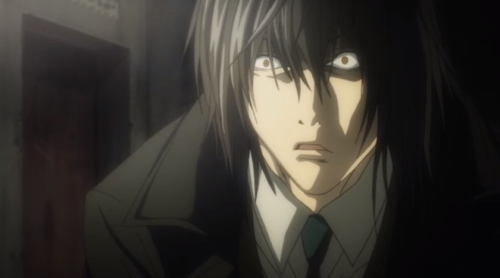
So, after watching Light being shot and falling into a puddle, Mikami is pretty devastated. He starts to fully understand that his chosen God is powerless now and there is nothing that can be done to turn this situation back around.
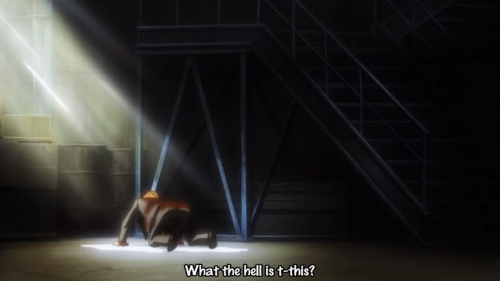
Light splashes around a little, cursing, driving this point home further.
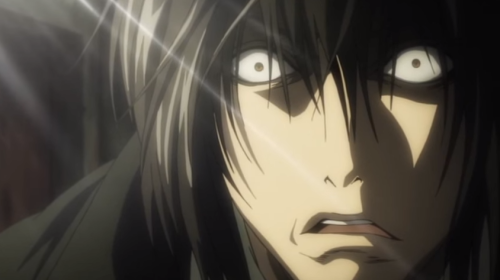
Mikami is, again, not amused. In earlier scenes we have seen recognition in regards to his own fuck-ups from Mikami. He does consciously realize that this happened because of a misunderstanding between him and God, that he isn’t innocent to this situation turning out this way.
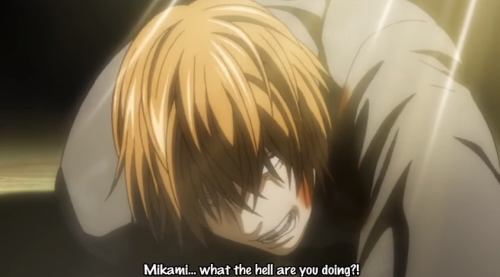
“Help! Write! Kill them!”
Light now calls out to Mikami specifically.
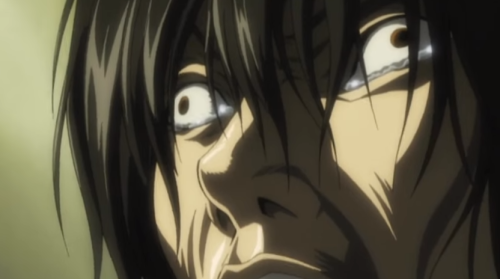
This does not actually cause Mikami to react in any other way than through tears. The focus shifts to other people for a moment, Mikami spends a good few seconds just standing like this, suffering as his world comes crashing down.
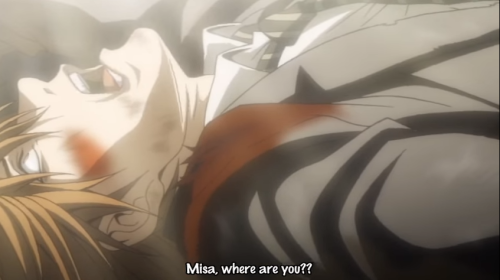
“Where’s Takada?”
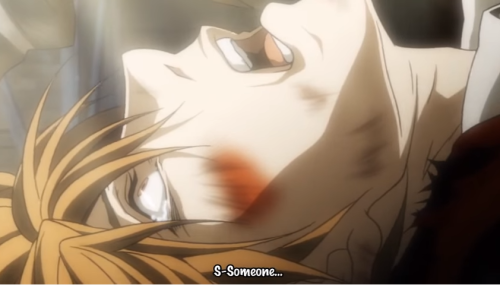
Meanwhile Light goes on to call out to other people, who are obviously also not going to help.
And THAT is when Mikami finally takes action.
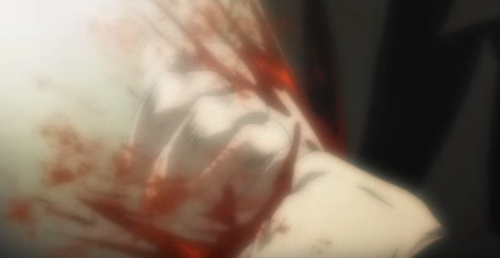
His suicide is not a response to Light calling out for him, it’s a response to the realization that God has run out of options. Takada is dead, Mikami knows that and Light knows that. Calling out for a dead woman is a sign of defeat if there ever was one.
God is out of options. Mikami has served a God who will be imprisoned as a mass murderer. Mikami has failed this God who ultimately isn’t on the winning side anyway. (Crash course about Mikami logic: Righteousness always wins. That Light doesn’t win must mean he wasn’t righteous, Mikami may think.)
This is a reality that is too much to handle. Mikami can neither forgive himself for failing Light nor for serving Light. I have not personally made up my mind which of these conflicting feelings is the dominant one for anime!Mikami and since we are not given any headthought whatsoever it is up for interpretation.
What’s important is that Mikami nopes out of the world because he personally has realized the hopelessness of living on.
Had he primarily killed himself to create diversion for Light, it would have cinematically been set after Light screams to him.
Further, important to note is that the way Mikami stabs himself is visually very similar to Seppuku, the traditional way of ‘honorable suicide’ in Japanese history. It can be, for example, a way of dying with honor rather than at the hands of the enemy (fits, he will not be executed by Near and co).
Creating diversion for Light might well be a side motive to Mikami’s death, but he is not first and foremost sacrificing himself.
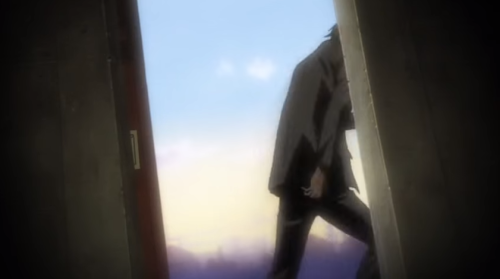
Light uses this to escape in either case. Whatever Mikami’s motivation was to stab himself in the aorta with a pen (which is physically impossible), Light doesn’t care, he’s running for it.
Now, for comparison, the manga has Mikami react directly after Light calls for him and prior to Light shifting focus to Misa and Takada.
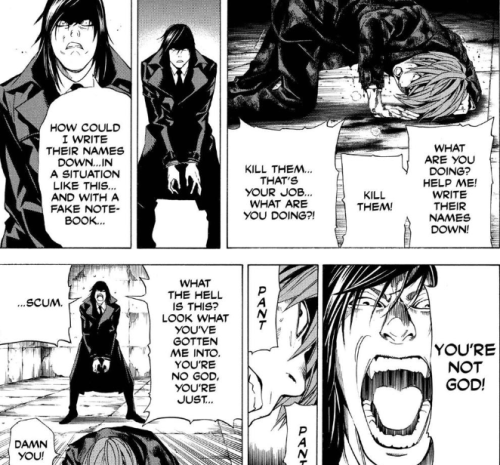
Mikami is talked to and responds immediately by denouncing Light. If you take this to be a genuine reaction rather than a Near-controlled act, it’s that Mikami here applies the logic of ‘God is out of options and won’t win -> he’s not God’ while also shifting the blame away from himself. In the end, Mikami has always been somebody who saw himself as good and blameless, so he’s rejecting his own failures.
I’d argue that Mikami’s anime-suicide may well be read to include a similar internal monologue to the things Mikami externalizes here, but it’s a scene that is very ambiguous and calling upon the viewer for their own interpretation.
If you wanted to make argument for the point of view that Mikami kills himself to save Light rather than because of disenchantment, you could cite that his corpse in the finale is shown between shots of dying Light and Misa killing herself - he is put in line with Light, who obviously represents his own ideals, and Misa, who represents the will to die for Light / because of Light.
I don’t find this vague bit of scene-setting to be convincing, since it may just as well just mean ‘look, all remaining Kiras are dead, the world is free of Kira’. There would have to be more parallel to make this a good argument, imo.
Either way, this is the extend of my thoughts on Mikami from one medium to another. Thanks for reading!
 malewife-lightyagami liked this
malewife-lightyagami liked this teddybeartragedy liked this
 stupidsexpotflanders liked this
stupidsexpotflanders liked this anatomyofdragons liked this
salmonsquid liked this
multiglory18 reblogged this from foxboy-light-yagami
multiglory18 liked this
foxboy-light-yagami reblogged this from yotsubaarc
foxboy-light-yagami liked this
yotsubaarc reblogged this from dykelawlight
cutenormalguy liked this
purplink8 reblogged this from mikami
purplink8 liked this
traggalicious liked this
dykelawlight reblogged this from mikami
kiwishibaa liked this
 scorpionmotordemon liked this
scorpionmotordemon liked this ilahloveshotch liked this
plkmin liked this
 ladylillith747 liked this
ladylillith747 liked this kira-savior liked this
 stellaplanckia liked this
stellaplanckia liked this lightwood-alec liked this
 mvkoto-nvegi liked this
mvkoto-nvegi liked this e-l-a liked this
basketcase1982 liked this
mikamimybeloved liked this
famousjae101 liked this
 sweetwitchy liked this
sweetwitchy liked this bass-basil liked this
 covered-with-ink liked this
covered-with-ink liked this  miazon liked this
miazon liked this  ilacedeon reblogged this from mikami
ilacedeon reblogged this from mikami  ilacedeon liked this
ilacedeon liked this miotyanblr reblogged this from mikami
miotyanblr liked this
naoto-shiroganes liked this
 cozycoldseasons liked this
cozycoldseasons liked this something-personal reblogged this from mikami
indemonology liked this
captaincatcatcaptain liked this
dn-fb reblogged this from mikami
godxnotes liked this
pandamonic liked this
 superfinebeam liked this
superfinebeam liked this  akirafoudou liked this
akirafoudou liked this mikami posted this
- Show more notes

